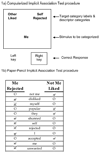Training implicit social anxiety associations: an experimental intervention
- PMID: 20102788
- PMCID: PMC2838945
- DOI: 10.1016/j.janxdis.2010.01.001
Training implicit social anxiety associations: an experimental intervention
Abstract
The current study investigates an experimental anxiety reduction intervention among a highly socially anxious sample (N=108; n=36 per Condition; 80 women). Using a conditioning paradigm, our goal was to modify implicit social anxiety associations to directly test the premise from cognitive models that biased cognitive processing may be causally related to anxious responding. Participants were trained to preferentially process non-threatening information through repeated pairings of self-relevant stimuli and faces indicating positive social feedback. As expected, participants in this positive training condition (relative to our two control conditions) displayed less negative implicit associations following training, and were more likely to complete an impromptu speech (though they did not report less anxiety during the speech). These findings offer partial support for cognitive models and indicate that implicit associations are not only correlated with social anxiety, they may be causally related to anxiety reduction as well.
(c) 2010 Elsevier Ltd. All rights reserved.
Figures



References
-
- American Psychiatric Association. Diagnostic and Statistical Manual of Mental Disorders. 4th ed. Washington, DC: American Psychiatric Association; 1994.
-
- Asendorpf JB, Banse R, Mucke D. Double dissociation between implicit and explicit personality self-concept: The case of shy behavior. Journal of Personality and Social Psychology. 2002;83:380–393. - PubMed
-
- Baccus JR, Baldwin MW, Packer DJ. Increasing implicit self-esteem through classical conditioning. Psychological Science. 2004;15:498–502. - PubMed
Publication types
MeSH terms
Grants and funding
LinkOut - more resources
Full Text Sources
Medical
Research Materials

